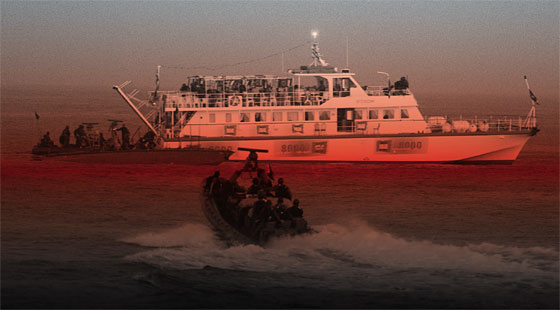
Last Sunday night, Leon Wieseltier, the longtime literary editor of The New Republic, was sitting at home in Washington browsing the Times’ website when he saw a troubling news bulletin: A flotilla of aid ships destined for the Gaza Strip was moving toward the Israeli coast. “I immediately exclaimed, ‘Oh, no,’ ” Wieseltier told me. “ ‘This won’t end well.’ ”
It didn’t.
For the group of American intellectuals who want to defend both liberal values and the State of Israel, this has been a tense and dispiriting season, a moment when friends become ex-friends. Even before the flotilla debacle, which quickly became an international embarrassment for the Netanyahu government, Israel’s hawkish stance has shifted the contours of the American conversation. Discussions about Israel always seem to end in yelling—demonstrating, in Wieseltier’s words, “the happy willingness of intellectuals and semi-intellectuals to form themselves into gangs and mobs”—but the yelling has gotten a little louder recently, and a little harder to avoid.
Last month, Peter Beinart, a former editor at The New Republic, published a long essay in The New York Review of Books blaming the American Jewish Establishment for failing the Zionist cause by insisting that the only honorable Zionist position was an absolute defense of the Israeli government. The emotional force of Beinart’s claim was that it operated at the level of identity: He suggested that the old American Jewish double consciousness—that it was possible to be both liberal and Zionist—might no longer be sustainable. Zionism had simply become too illiberal.
These were fighting ideas—published in The New York Review of Books, no less. Jonathan Chait, a colleague of Wieseltier’s, described Beinart as “one of the most brilliant people I’ve ever known” before accusing him of “shaving off the rough edges of reality.” Their ensuing debate—pained and intimate, conducted mostly over blogs—echoed a feud earlier this year between Wieseltier and Andrew Sullivan at TheAtlantic. Formerly a close friend of Sullivan’s, Wieseltier had called Sullivan’s recent critical writings on Israel “disgusting,” and Sullivan shot back, accusing Wieseltier of accusing him of anti-Semitism, but “without even the candor to say so.”
It was exhausting to read. “It feels like it’s been a couple of months, but in fact it’s only been a couple of weeks,” Beinart told me. Unexpectedly, though, the fallout from the flotilla has brought a weird concordance, as even the hawks conceded that the Netanyahu government had blundered badly. Wieseltier wrote that Israel had “somehow found a way to lose the moral high ground,” and Sullivan quoted this on his blog, calling it “a brilliant little piece.”
Indeed, by the end of last week, the conversation seemed to have settled in a place slightly different from what anyone had expected. For years, those who argued about Israel and a Palestinian state could agree that there was an asymmetry in competence: Israel, whether or not you agreed with its politics, boasted military forces that operated at the level of myth. Arafat’s Palestinian Authority, and the more radical politics that followed, were an ignominious, murderous mess.
But these two certainties have both begun to teeter. Palestinians, under the influence of the technocratic prime minister Salam Fayyad, have begun an earnest, if embryonic, project of state-building. And the confrontation at sea underscored an idea that had been simmering among Israel supporters since the Lebanon War in 2006: that, in the words of the Israeli columnist Ari Shavit, “my 6-year-old son could do much better than our current government.”
The dispiriting facts of the flotilla encounter have brought a refreshing specificity to the debate Stateside. The argument following Beinart’s essay was abstract and historical, focused on who bears responsibility for the trajectory of Israeli politics. Now, with the prospect of more flotillas on the horizon, the discussion has turned to whether the human costs of Israel’s blockade are too high. “What happened at sea is the easy case, not the hard case,” Wieseltier told me. On the Israel question, you take respites where you can get them.
Have good intel? Send tips to intel@nymag.com.